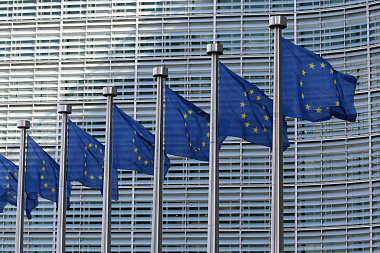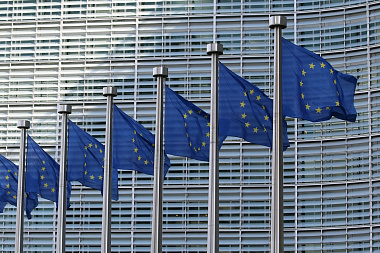- Council Regulation (EU) No.
2024/1739 of 24 June 2024 amending Regulation (EU) No.269/2014 (“Regulation 1739” and “Regulation 269”, respectively); and - Council Regulation (EU) No.
2024/1745 of 24 June 2024 amending Regulation (EU) No.833/2014 (“Regulation 1745” and “Regulation 833”, respectively).
Restrictions on the LNG sector
The EU has imposed additional restrictions on the Russian liquefied natural gas (“LNG”) sector, in particular:- the prohibition on investment in the Russian energy sector was supplemented by reference to projects under construction for the production of LNG; and
- a prohibition on EU PersonsEU sanctions measures are binding:
- within the EU territory;
- for EU nationals regardless of their location;
- for EU-registered legal entities and their branches and representative offices;
- for any persons within the EU territory, regardless of their nationality; and
- on board any aircraft or vessel under the jurisdiction of an EU member state (collectively, “EU Persons”).
LNG-2 , Murmansk LNG and others.
- shall not affect the import of LNG, but only its
re-export to third countries via the EU; and - shall not apply to the execution until 26 March 2025 of contracts concluded before 25 June 2024.
Prohibition on the use of SPFS
Due to the fact that most major Russian banks have been disconnected from the SWIFT system, the Bank of Russia has been actively developing, including outside Russia, the System for Transfer of Financial Messages (“SPFS”), which is similar in terms of functions.From 25 June 2024, EU Persons operating outside of Russia are prohibited from connecting to the SPFS or other similar systems developed by the Bank of Russia.
EU Persons are also prohibited from transacting with persons listed in Annex XLIV to Regulation 833, which would include persons established outside of Russia that use the SPFS or similar systems. However, EU Persons are not prohibited from transacting with Russian companies using the SPFS, provided that the EU Persons themselves do not connect to the SPFS.
The abovementioned prohibitions shall not apply:
- to the execution until 26 September 2024 of contracts concluded with the persons listed in Annex XLIV before 24 March 2024 or of ancillary contracts necessary for the execution of such contracts;
- to the receipt of payments due to the persons listed in Annex XLIV under contracts executed before 24 March 2024; and
- in a number of other cases stipulated in Regulation 1745 (in particular, in relation to transactions involving the acquisition, import or transport to the EU from or through Russia of natural gas, titanium, aluminium, copper, nickel, palladium, iron ore, medicines, medical products, agricultural products and food, etc).
Prohibition on transacting with financial institutions and crypto asset service providers
Article 5ad has been added to Regulation 833, according to which EU Persons are prohibited from engaging in any transactions with financial and credit institutions and crypto asset service providers established outside the EU if the abovementioned entities facilitate transactions involving the sale, supply, transfer and/or export to Russia ofNew measures in relation to the impact of EU sanctions on dispute resolution
On 8 June 2020, the Arbitrazh Procedure Code of the Russian Federation (“APC RF”) was supplementedBased on Federal Law No. 171-FZ of 8 June 2020 by Articles 248.1 and 248.2, which created a procedural mechanism allowing sanctioned persons to file claims and/or seekEU Persons are now prohibitedIt is worth noting that Regulation 1745 specifies incorrect Article 248 of the APC RF (instead of Articles 248.1 and 248.2 mentioned above), but this provision is likely to be corrected in the near future. from directly or indirectly entering into any transactions with legal entities which, on the basis of Article 248 of the APC RF or similar provisions of Russian law, have brought an action/application in a Russian court against European individuals or legal entities to obtain an injunction, order, judgment or other judicial act in a dispute relating to any agreement or transaction, the execution of which was affected by the measures established by Regulation 833 or Regulation 269. These persons will be specified in Annex XLIII to Regulation 833, which has not yet been formed.
In addition, Article 11a was added to Regulation 833, which gives EU Persons the right to recover, in judicial proceedings before the competent courts of EU member states, any damages (including legal costs) incurred by those persons as a consequence of claims lodged with courts in third countries in connection with any contract or transaction the performance of which has been affected by the measures imposed under Regulation 833, provided that the EU persons concerned do not have effective access to the remedies in the relevant foreign jurisdiction. This rule primarily concerns Russian litigation initiated on the basis of Articles 248.1 and 248.2 of the APC RF referred to above.
Finally, EU Persons are also entitled to recover, in judicial proceedings before the competent courts of EU member states, any damages (including legal costs) caused to them by any persons that benefited from decisions taken pursuant to Presidential Decree No. 302 “On the Temporary Administration of Certain Assets” (“Decree No. 302”) or similar Russian legislation, provided that:
- such decisions are illegal under international customary law or under a bilateral investment treaty entered between an EU member state and Russia; and
- the relevant EU person does not have effective access to the remedies in Russia.
Fighting the circumvention of EU sanctions
The EU has put in place a number of additional measures to ensure compliance with EU sanctions by third country persons.Specifically, EU Persons are now required to use their best efforts to ensure that their
In addition, EU Persons selling, supplying, transferring or exporting the military goods and technology listed in Annex XL to Regulation 833 are obliged from 26 December 2024 to:
- take steps to identify and assess the risks of exportation to Russia and exportation for use in Russia for such goods or technology, and ensure that those risk assessments are documented and kept up to date;
- implement appropriate policies, controls and procedures to mitigate and manage effectively the risks of exportation to Russia and exportation for use in Russia of such goods or technology; and
- ensure that similar measures are implemented in their subsidiaries established outside the EU which are engaged in such activities.
This prohibition does not apply to the execution of contracts that were entered into before 25 June 2024, before 26 June 2025 or before their expiry (whichever is earlier).
Sectoral sanctions targeting vessels
Regulation 833 was supplemented with Article 3s imposing restrictions on vessels listed in Annex XLII. 27 vessels have already been listed in Annex XLII in the EU’s 14th sanctions package.The grounds for including vessels in Annex XLII are, inter alia, the following:
- transporting goods and technology used in the defence and security sector, from or to Russia, for use in Russia;
- transporting crude oil or petroleum productsListed in Annex XXV to Regulation 833 that originate in Russia or are exported from Russia while practising irregular and
high-risk shipping practices; - operating vessels for the purpose of development or expansion of the energy sector in Russia;
- transporting certain goods originating in or exported from the EU (eg jet fuel and fuel additives), and goods generating significant revenues for Russia, originating in or exported from Russia and imported into the EU;
- operating vessels in order to facilitate or engage in the violation or circumvention of EU sanctions; and
- ownership, charter or operation by, in the name of, on behalf of, or for the benefit of EU asset freeze targets.
- EU Persons are prohibited from:
- providing access to EU ports, anchorage zones and locks to such vessels;
- importing into the EU, purchasing or transferring such vessels;
- selling, supplying, chartering or exporting such vessels;
- operating or crewing such vessels;
- providing flag registration for the benefit of such vessels;
- providing financing and financial assistance, including insurance, as well as brokering services, including ship brokering, for such vessels;
- providing technical assistance and other services including bunkering, ship supply services, crew change services, cargo loading and discharge services, fendering, and tug services to the benefit of such vessels; and
- engaging in ship-to-ship transfers, transfers of cargo with or procuring services from such vessels.
Ban expanded on Russian persons using EU airspace
As of 28 February 2022, Regulation 833 contained a provision prohibiting Russian air carriers from landing in, taking off from, or overflying the EU territory.Previously, this prohibition only applied to aircraft owned or possessed by Russian persons, but Regulation 1745 expanded such prohibition. Article 3d(1) of Regulation 833 now specifies that the prohibition also applies to any aircraft used for
Intellectual property restrictions
The EU has imposed a ban on accepting new applications for the registration in the EU of trademarks, patents, industrial designs, utility models, protected designations of origin and geographical indications filed by Russian natural persons or legal persons (including if jointly filed by a Russian person with one or moreThis measure was introduced in response to the unlawful, in the EU’s view, actions of the Russian courts and the Russian Government, which stopped protecting the intellectual property of EU Persons in Russia.
However, the ban does not apply to nationals of EU member states, the European Economic Area and Switzerland, or to persons having a temporary or permanent residence permit in such states.
Providing services to Russian subsidiaries of EU Persons
Previously, Regulation 833 contained a derogation from the prohibition under Article 5n for EU Persons to provide a wide range of servicesIn particular, auditing, accounting, tax consulting services, business and management consulting services, public relations services, architectural and engineering services, legal advisory services, IT consultancy services, etc to Russian legal entities: until 20 June 2024, it was permitted to provide such services to Russian legal entities owned or controlled by a legal entity established in an EU member state, the European Economic Area, Switzerland or an EU partner stateThe US, Japan, the UK, South Korea, Australia, Canada, New Zealand, Norway and Switzerland (“Subsidiaries”). This derogation has now been extended until 30 September 2024. In addition, Article 5n has been supplemented by a new derogation whereby the abovementioned prohibition does not apply to nationals of EU member states resident in Russia who acquired this status before 24 February 2022, if they provide relevant services to Subsidiaries which are their employers and the services are intended exclusively for such Subsidiaries.EU asset freezing sanctions
Regulation 1739 extends the list of persons subject to EU asset freezing sanctions provided under Regulation 269. The updated list includes 69 individuals, including cultural figures (TV presenters, singers, actors, etc), government officials, judges, members of governing bodies and owners of companies associated with the Russian military-industrial complex.Sanctions have also been imposed in relation to 47 legal entities in the following sectors of the Russian economy:
- aviation (Hydromash, Ural Airlines, Volga Dnepr, Aeroelectromash, etc);
- transport (Sovcomflot, Vostochnaya Stevedoring Company, etc);
- construction (R-STROY, etc);
- radio electronics (United Instrument Manufacturing Corporation, NPP Istok, etc);
- energy (Siberian Service Company, etc);
- Internet (Institute for Internet Development, etc) and other entities.
- “(j) entities established in Russia, previously owned or controlled by entities established in the Union, ownership or control of which has been compulsorily transferred by the Government of the Russian Federation through laws, regulations, other legislative instruments or other action of a Russian public authority, or natural or legal persons, entities or bodies that have benefitted from such a transfer, and natural persons who have been appointed to the governing bodies of such entities in Russia without the consent of the Union entities which previously owned or controlled them”.
In addition, the EU continues to impose
As a reminder, the EU asset freezing sanctions have the following consequences:
- EU Persons are required to block (freeze) funds and economic resources owned, held or controlled by sanctioned persons; and
- EU Persons are prohibited from directly or indirectly making available funds and economic resources to or for the benefit of sanctioned persons.







